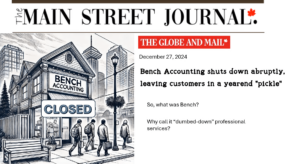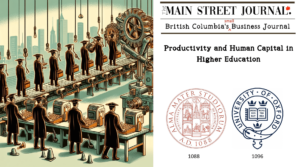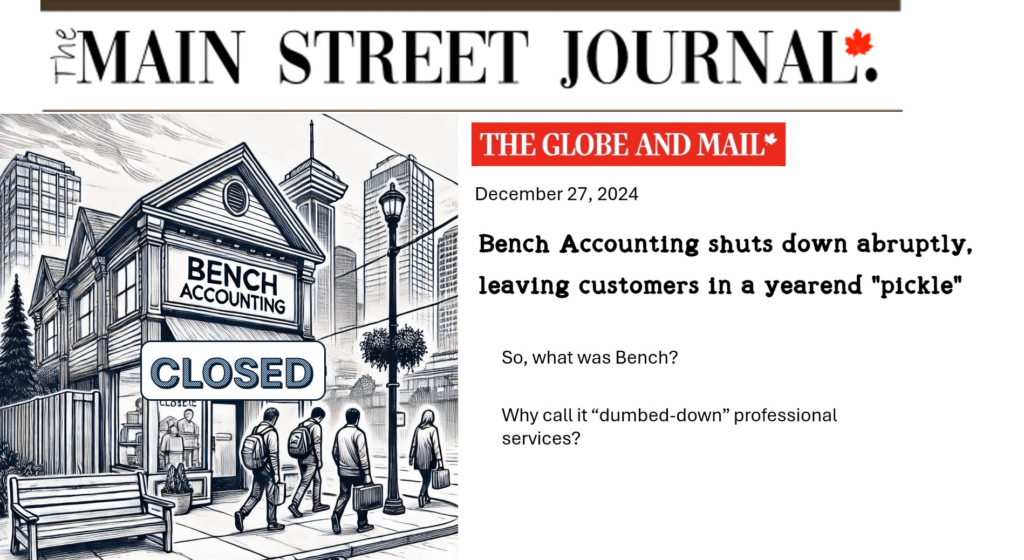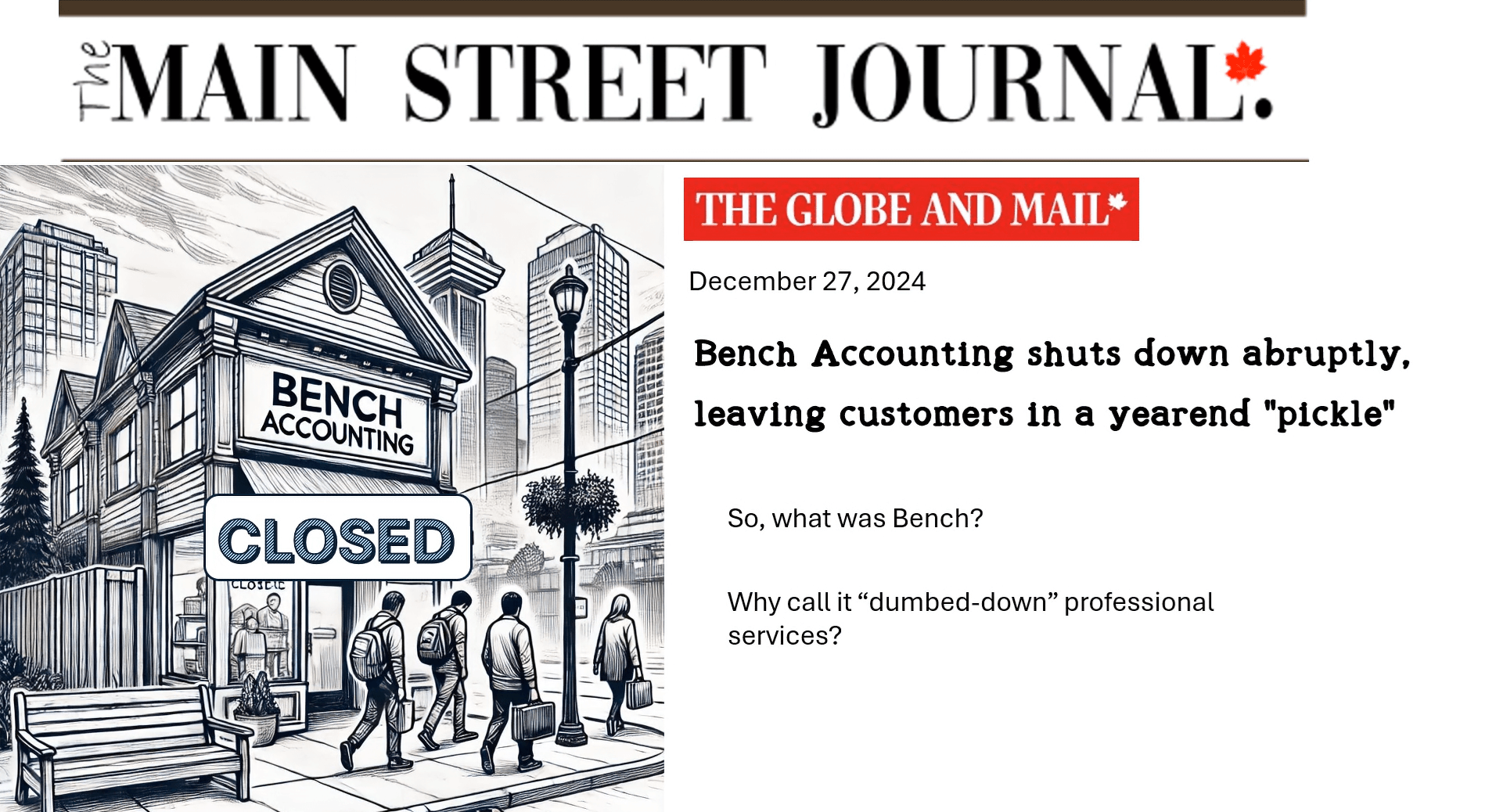Canada’s Business Development Bank weighs in on the ‘decline in the number of Canadian entrepreneurs’
A few days ago, I came across several articles in the Globe and Mail on a new study by the BDC and the University of Montreal. The study addressed a supposed decline in the number of Canadian ‘entrepreneurs’.
“The study estimates there are 100,000 fewer business owners than there were 20 years ago, and just 1.3 individuals out of 1,000 started a business in 2022, compared to three out of 1,000 in 2000.”
Then yesterday, the CBC published an article on the same topic – undoubtedly to coincide with BDC’s Small Business Week.
First, it’s useful to understand how they defined an “entrepreneur”:
“a self-employed worker who hires employees to support their venture”
And why is this happening?
- People in their late 20s to early 40s are the most likely to start businesses, but that demographic is shrinking with Canada’s aging population, leaving a smaller pool of candidates as potential founders.
- Low unemployment and high wages mean fewer people feel the need to start a new business.
- Business owners and would-be entrepreneurs face a barrage of discouraging factors, such as labour shortages, inflation, technological change and the increasing domination of large companies.
However there are many problems with their analysis.
First of all, they didn’t bother to check reliable statistics. Why pay Angus Reid when Industry Canada already collects that data?
Perhaps the Industry Canada data didn’t align with the story they wanted to tell.
Figure 3: Birth rate by initial business size, Canada, 2001−2019[1]
[1] Key Small Business Statistics 2022 – Industry Canada
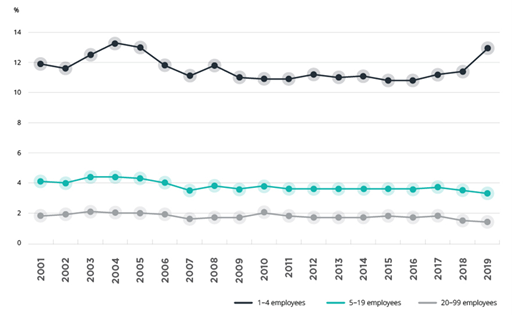
“The survey data was collected online by the Angus Reid Institute in two waves in March: a 1,259-person sample of established small-business owners, and another 1,001-person sample of new or aspiring entrepreneurs. The University of Montreal also surveyed 230 of its students in June. BDC conducted in-depth interviews with experienced entrepreneur coaches to help interpret the results.”
According to Industry Canada, from 2001 through 2019, the number of new business starts has been relatively consistent. Clearly, the Industry Canada statistics tell a much different story than the BDC.
We should also have issues with their definition of an “entrepreneur.”
In my view, at least, self-employment is often merely an employment alternative. Doctors, lawyers, accountants, carpenters, and electricians are often self-employed. Does this make them entrepreneurs?
I don’t think so.
Another of their assumptions also appears to be misguided:
“People in their late 20s to early 40s are the most likely to start businesses, but that demographic is shrinking with Canada’s aging population, leaving a smaller pool of candidates as potential founders.”
In 2018, the National Bureau of Economic Research[1] in the US published a study debunking the myth of the successful twenty-something startup founder.
AGE AND HIGH-GROWTH ENTREPRENEURSHIP
ABSTRACT
Many observers, and many investors, believe that young people are especially likely to produce the most successful new firms. We use administrative data at the U.S. Census Bureau to study the ages of founders of growth-oriented start-ups in the past decade. Our primary finding is that successful entrepreneurs are middle-aged, not young. The mean founder age for the 1 in 1,000 fastest growing new ventures is 45. The findings are broadly similar when considering high-technology sectors, entrepreneurial hubs, and successful firm exits. Prior experience in the specific industry predicts much greater rates of entrepreneurial success. These findings strongly reject common hypotheses that emphasize youth as a key trait of successful entrepreneurs.
The study found that the average age of a startup founder in the US is 41.9 years of age among all startups that hire at least one employee. And, among the top 0.1 percent of highest-growth startups, that average age moves up to 45 years old. (Note that ages are taken from the time of the founding of the company.)
So, if the average age of founders of all startups that hire at least one employee is 41.9 years of age, that should suggest that experience is probably the best teacher. At age 42 these are not recent MBA graduates. If this analysis is indicative of their business advisory skills, it is probably over-priced.


